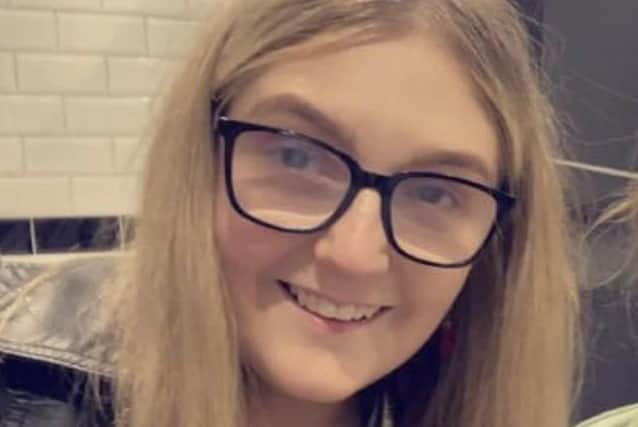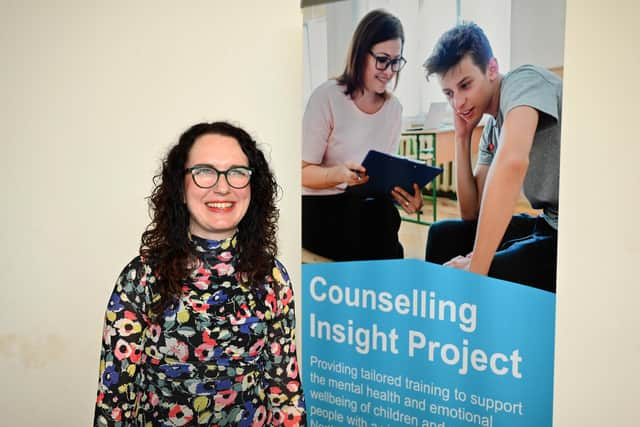NI School counsellors to receive training to provide emotional support to blind and visually-impaired children


Leah Tylor, 20, from Feeny, said at school she often felt marginalised due to her sight loss.
“At school I had a support teacher. They would visit the school and advise on print sizes or formats for schoolwork and that kind of thing but there was still so much of the school experience that I didn’t feel supported in.
Advertisement
Hide AdAdvertisement
Hide Ad"I remember struggling with my GCSEs, particularly maths. I couldn’t see to do the exam papers, especially those with graphs and other kinds of graphics or pictures. I remember thinking that I was going to fail my maths exam, all because I couldn’t see.


“Looking back now, I believe that some sort of counselling or emotional support would have helped me but that just wasn’t an option.
"I felt isolated at school. It felt like everyone else was getting on with life and I
was outside all that.
"I know it was meant to help, but I found the fact that I always seemed to have a
Advertisement
Hide AdAdvertisement
Hide Adclassroom assistant nearby, prevented me from mixing properly with the others in my class. There was always this grown-up hanging round me and that affected how my class reacted to me.”
“I had so much trouble making friends. My confidence was very low. Even as we all got older.
"The others would be planning nights out and meeting up outside school and whilst I did make some friends, it just felt like there was always that barrier there stopping me being fully accepted.”
“I just wish that when I was at school, the teachers and other school staff
Advertisement
Hide AdAdvertisement
Hide Adsimply had more awareness of disability and what that meant for those of us living with it. I don’t just mean sight loss but all disabilities.
"My school life could’ve been so different had someone just been there who
understood.
"School students need encouragement and shown how they can realise their dreams or ambitions. It’s not just enough to make sure they have the right text size. It takes more than that. I was so shy at school and was too afraid to speak up and say what I thought or ask for help. I felt I already stuck out enough and didn’t want to ask a lot of questions. I’d like to say to people growing up now, just speak out to someone. Share how you feel with your family or friends or someone else you trust.”
Leah, who is currently in her second year studying social work at Liverpool Hope University, added: “I recently lost quite a bit of the remaining vision in my left
Advertisement
Hide AdAdvertisement
Hide Adeye, which was my good eye. I would say my eyesight now is very poor. I’m trying to make the most of what sight I have left but it’s very difficult.
“When I’m working on my laptop, I use ZoomText magnification software
but recently I have the magnification turned so far up that it’s becoming
harder and harder to use.”
Leah is sharing her story as two NI sight loss charities come together to offer first of its kind training for school counselling staff.
Advertisement
Hide AdAdvertisement
Hide AdLet’s ‘Make it Better Together’ for children and young people with visual
impairment, was the message for counselling professionals at an event
held recently in Belfast.
The event was to formally launch the Counselling Insight Project - a two year project offering specialist accredited training for those who provide counselling within an education setting.
The project is being led by RNIB NI (The Royal National Institute of Blind People), in partnership with Guide Dogs NI.
Advertisement
Hide AdAdvertisement
Hide AdThe two-day training course will be delivered by RNIB BACP qualified counsellors, who hold experience of working with visually impaired and blind children and young people.
Welcoming the training, local singer and winner of the Voice UK 2013, Andrea Begley, said: "I myself went to a mainstream school and had to negotiate some difficult emotions when growing-up as a person with sight loss.
"I felt that I was different to those around me and that was hard at times. I
really encourage those who provide counselling services to young people in schools to avail of this free training, as it will make such a difference to the support available.
Advertisement
Hide AdAdvertisement
Hide Ad"Most of all, I would say to children or young people living with a visual impairment today, never be afraid to ask for help or tell someone you trust what you’re going through.”
Head of Counselling and Mental Health at RNIB, Amanda Hawkins, said: “I’m determined that we work to give children and young people with visual impairment confidence to grow up to be adults who feel able to make the most of the opportunities that inevitably lie before them and go on to live the lives they want to live.”
Miriam DeGroot, SISS Operations Manager (Children & Young People) -
Guide Dogs NI, said: “We are delighted to collaborate with the RNIB on this initiative and hope it will further strengthen the emotional support available to a child and their family at critical times in their development.”
Advertisement
Hide AdAdvertisement
Hide AdTo learn more about the free, specialist, online training, contact
Counselling Insight Project support manager Janice Taylor-Clarke on:
07840 334 118, or email: [email protected]
You can also contact the RNIB Helpline on 0303 123 9999 or